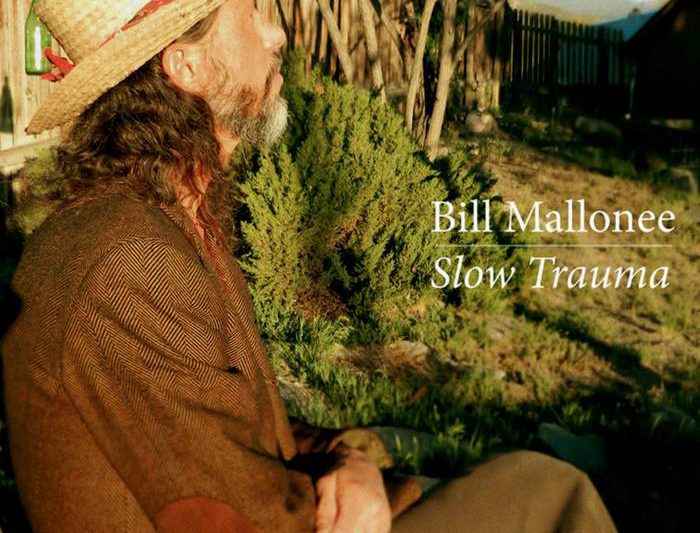I’ll start this review with a disclaimer. I’ve been a fan of Bill Mallonee since he and his band, Vigilantes of Love, stopped by the Christian college I attended, in a sleepy little Indiana town, back in 1994. Back then Bill sported long, sun-faded hair, John Lennon glasses and played a big yellow Les Paul. Musically, he introduced me, a kid heavy into both Seattle grunge and Christian alternative, to the world of “americana” or “alt-country” (whatever they were calling it then). Really, he was introducing me to Woody Guthrie, and inciting me to give a second listen to Dylan and Young. Why? Because the ragged honesty and even rebellion “against the system” I was finding in the flannel bands had their roots, really, with those first truth-tellers. The lore of Uncle Tupelo says that Jay Farrar and Jeff Tweedy were in punk bands before realizing the most punk rock thing to do was to start playing country music.
Now, in 1994, Bill wasn’t playing ‘country music’, I’m not sure what it was, hard to categorize, but to our young Christian-college kid ears, it was, more than anything REAL. We felt like he was singing right to us, and letting us in on some of the dirty secrets of ‘real life’. It’s like we were getting some wisdom. Mallonee always came across (still does) like a prophet of sorts.A prophet is one who has been given a certain vision of how things really are. These things that are supposed to be communicated to the people, but these things are kind of hard to describe. So this predicament can make the prophet come across as a bit frenetic, confrontational, always unconventional, often misunderstood. Prophets often can’t help but wear their “hearts on their sleeve” which can make people uncomfortable. Bill sang about sex, racism, materialism, and corruption in the system, including in the “Christian marketplace”. It wasn’t the feel-good candy we were fed by some other so-called “Christian” music, but it was also not the bleak picture painted by some of our heroes who could sing about the hurt and disenfranchisement but offered no hope. Bill was in between, which is a difficult place to be, especially when it comes to the “market” side of things. Bill wasn’t giving us a product to be consumed, he was giving us something to wrestle with, to chew on. Bill’s records invited us to pour over the lyrics, to learn the stories behind the songs, to question our own assumptions. His music wasn’t for the quick fix, it was for the long haul.
Since 1994, Bill has released over 50 albums, musically spanning genres which include ’60s brit-pop, psychedelia, Bakersfield country, “Crazy Horse” slow-burn guitar rock, and troubadour storyteller folk. But no matter what the dress-up, underneath the music is that prophets-soul, the one that requires attention in order to really “get”. And, yes, he still might make you feel uncomfortable. Since the early 2000’s Bill has made his home near Santa Fe, New Mexico. The influence of the high-desert southwest has been evident on Bill’s recordings over the past decade. With the exception of 2011’s “Power and Glory” and 2012’s “Amber Waves” the arrangements have been more sparse, open, with fewer anthems and more character sketches, stories of drifters, losers, doubters, and fighters. Bill’s last three releases, “Winnowing”, “Lands and Peoples” and “Slow Trauma” find Bill’s “high desert” era sound refined and mastered, providing beautiful landscapes for the stories to be told.
But the thing is, you have to be willing to listen. Bill’s latest “Slow Trauma” is a record that requires, even demands a real listen. On headphones, or even a roadtrip. In fact, what might make the listener uncomfortable in today’s world of quick downloads, multitasking, and music as “files” is that you have to stop and listen to it. It’s not disposable, not cheap, and not just background noise.
From the first track, the listener is given a challenge. Musically, “One and The Same” is beautifully disorienting. It reminds me of Jay Farrar’s “Terroir Blues”, warm, personal, inviting, but not conventional by any means. It feels as if it might disintegrate at any minute and is a song that is curiously over before it has begun. Just as the words “What you hold onto, and what you let go of, and what you should give away, What’s gonna save you and what makes you smile? Sometimes, they are one in the same” pass by, the song has ended. With its end, “Slow Trauma” is introduced, an album filled with stories of the long-effects of enduring doubt, disappointment, displacement, and ultimately the dissonance of knowing “You’ll get a new set of wheels on the King’s Highway” while facing daily that “things are looking pretty dark and pretty cold”.
Musically, “Slow Trauma” like its ‘sister’ albums “Winnowing” and “Lands and Peoples” is unmistakably reminiscent of Neil Young’s “Harvest” era, especially in its core backbeat and bass sounding very much like the classic records. “WPA” is probably the most Neil-esque track on the record (a great song, by the way). But there are also clear threads of psychedelia (Doldrums in Denver) and Bakersfield dusty country (Ironclad) woven in the tapestry. It’s really a beautiful album, with a certain feel of “intentionality” that comes through the sound of the fingers on the strings, the interplay of notes, and the warm, tremolo-rich guitars. Bill’s albums have always been known for having great closers. “Slow Trauma” is no exception. “That Last Hill” a confessional hymn of surrender in the face of unanswered questions, ends with the prayer “Lord gather me unto Thyself when my wayward heart grows still. I just wanna see over that last hill.”
Knowing Bill’s beyond-prolific life of writing and recording, this is surely not even close to the “last hill” he will invite his listeners to join him in walking. But it is good to know that there are still writers like Bill Mallonee who are willing to lead us towards something more than an easy fix, a quick answer, a cheap thrill, but still bring a word, a prophetic word, even, that may require work to really hear, but are absolutely worth it.
You can purchase “Slow Trauma” or check out any of Bill’s 70+ releases here


Leave a Comment